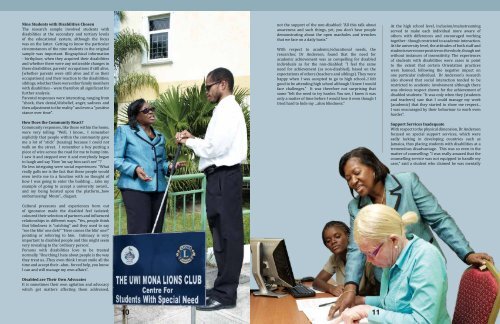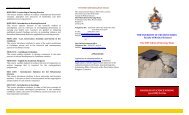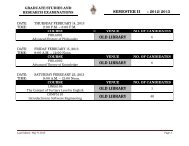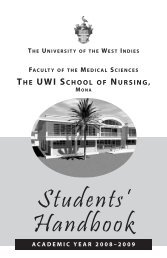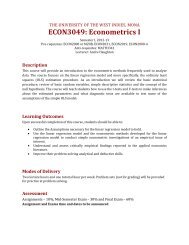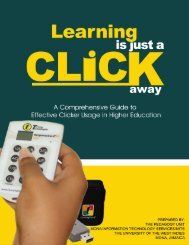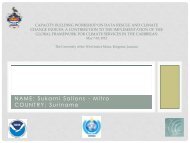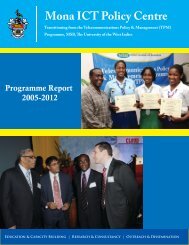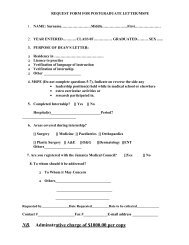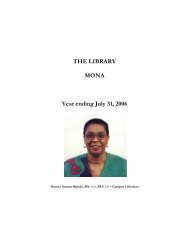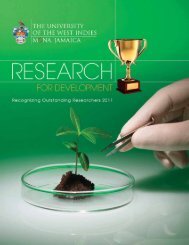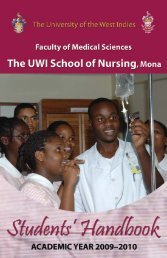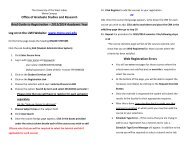Download Pdf - Uwi.edu
Download Pdf - Uwi.edu
Download Pdf - Uwi.edu
- No tags were found...
You also want an ePaper? Increase the reach of your titles
YUMPU automatically turns print PDFs into web optimized ePapers that Google loves.
Nine Students with Disabilities ChosenThe research sample involved students withdisabilities at the secondary and tertiary levelsof the <strong>edu</strong>cational system, although the focuswas on the latter. Getting to know the particularcircumstances of the nine students in the originalsample was important. Biographical information- birthplace, when they acquired their disabilitiesand whether there were any noticeable changes inthese disabilities, parents’ occupations if still alive,[whether parents were still alive and if so theiroccupations] and their reaction to the disabilities;siblings, whether there were other family memberswith disabilities – were therefore all significant forfurther analysis.Parental responses were interesting, ranging from“shock, then denial/disbelief, anger, sadness andthen adjustment to the reality” and even a “positivestance over time”.How Does the Community React?Community responses, like those within the home,were very telling: “Well, I know... I rememberexplicitly that people within the community gaveme a lot of “stick” (teasing) because I could notwalk on the street. I remember a boy putting apiece of wire across the road for me to bump into.I saw it and stepped over it and everybody beganto laugh and say ‘How ‘im say him can’t see’ ”?No less intriguing were social experiences: “Whatreally galls me is the fact that these people wouldeven invite me to a function with no thought ofhow I was going to enter the building .. .take myexample of going to accept a university award...and my being hoisted upon the platform...howembarrassing! Mmm”... disgust.Cultural pressures and experiences born outof ignorance made the disabled feel isolated;coloured their selection of partners and influencedrelationships in different ways. “Yes, people thinkthat blindness is “catching” and they used to say“see the blin’ one deh!” “Here comes the blin’ one!”pointing or referring to him. Intimacy is veryimportant to disabled people and this might seemvery revealing to the ‘ordinary person’.Persons with disabilities love to be treatednormally. “One thing I hate about people is the waythey treat us...They even think I must smile all thetime and accept their ..ahm.. forced help, you know.I can and will manage my own affairs”.Disabled are Their Own AdvocatesIt is sometimes their own agitation and advocacywhich get matters affecting them addressed,not the support of the non-disabled: “All this talk aboutawareness and such things, yet, you don’t hear peopledemonstrating about the open manholes and trenchesthat we face on a daily basis.”With respect to academic/<strong>edu</strong>cational needs, theresearcher, Dr Anderson, found that the need foracademic achievement was as compelling for disabledindividuals as for the non-disabled: ”I feel the sameneed for achievement (as non-disabled), based on theexpectations of others (teachers and siblings). They werehappy when I was accepted to go to high school...I feltgood to be attending high school although I knew I wouldface challenges.” It was therefore not surprising thatsome “felt the need to try harder. You see, I knew it wasonly a matter of time before I would lose it even though Itried hard to hide my ...ahm blindness.”At the high school level, inclusion/mainstreamingserved to make each individual more aware ofothers with differences and encouraged workingtogether - though restricted to academic interaction.At the university level, the attitudes of both staff andstudents were more positive on the whole, though notwithout instances of insensitivity. The experiencesof students with disabilities were cases in pointto the extent that certain Orientation practiceswere banned, following the negative impact onone particular individual. Dr Anderson’s researchalso showed that social interaction tended to berestricted to academic involvement although therewas obvious respect shown for the achievement ofdisabled students: “It was only when they (studentsand teachers) saw that I could manage my work(academic) that they started to show me respect...I was encouraged by their behaviour to work evenharder”.Support Services InadequateWith respect to the physical dimension, Dr Andersonfocused on special support services, which weresadly lacking in developing countries such asJamaica, thus placing students with disabilities at atremendous disadvantage. This was so even in thematter of counselling: “I was really amazed that thecounselling service was not equipped to handle mycase,” said a student who claimed he was mentally10 11


